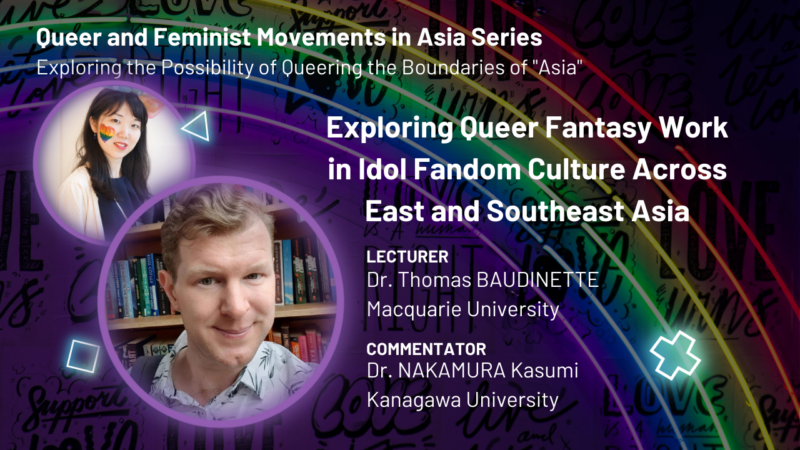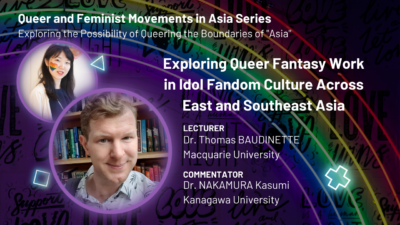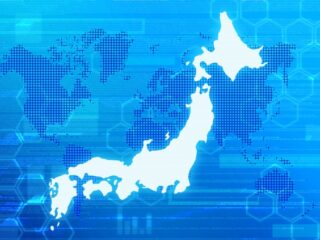Exploring Queer Fantasy Work in Idol Fandom Culture Across East and Southeast Asia (Lecture by Dr. Thomas BAUDINETTE)

| Date(s) | Friday, 1 November 2024 14:00-15:30 JST |
|---|---|
| Venue |
Zoom Webinar (Register here) |
| Registration | Pre-registration required |
| Language | English only |
| Abstract |
Much of the scholarly literature exploring the production and consumption of the celebrities known as “idols” has emphasized how idol fandom operates to produce consumer groups ripe for exploitation. One concern of this scholarship has been charting the hetero-patriarchal ideologies central to idol production which transform marginalized subjects into passive consumers whose political agency is significantly reduced. That is, idol fandom is often theorized as predicated on postfeminist consumer practices that bolster capitalist accumulation and therefore contribute to the political disenfranchisement of women and LGBTQ+ consumers. Within this presentation, Prof. Baudinette draws upon over a decade of ethnographic observations of idol fandom both within the established idol markets of East Asia (Japan and South Korea) and the emergent idol markets of Southeast Asia (the Philippines and Thailand) to challenge this account of idol fandom. He argues that the fundamentally transformative nature of fan subjectivity encourages the production of queer fantasies tied to idols that marginalized social subjects can utilize to critique the social structures which disadvantage them. He unpacks how LGBTQ+ fans across Asia transform idol fandom into a queer space where their fantasy work creates transnational solidarities grounded in the political project of queer emancipation. Through this discussion, he theorizes “queer fantasy work” as it is tied to idol fandom as an explicitly political force in contemporary Asian culture designed to actively produce a more egalitarian and hopeful world. |
| Program |
Lecture Comment Q&A Moderators |
| Speaker Profile |
Dr. Thomas BAUDINETTE is Senior Lecturer in Global Cultures at Macquarie University, Australia. A cultural anthropologist, his research explores the role popular culture plays in shaping knowledge about gender and sexuality across East and Southeast Asia. His first book is Regimes of Desire: Young Gay Men, Media, and Masculinity in Tokyo (University of Michigan Press, 2021). His second book is Boys Love Media in Thailand: Celebrity, Fans, and Transnational Asian Queer Popular Culture (Bloomsbury, 2023). He recently completed the Academy of Korean Studies funded project “Exploring K-pop Fandom as a Space for LGBT Support in the Asia-Pacific During Pandemic Times” (AKS-2022-R033). Thomas is currently working on his third book, tentatively titled Queer Fantasies of Asia: Japanese and Korean Media Fandom in the Philippines. |
| Organized by | Tokyo College, The University of Tokyo |
| Contact | tokyo.college.event@tc.u-tokyo.ac.jp |














